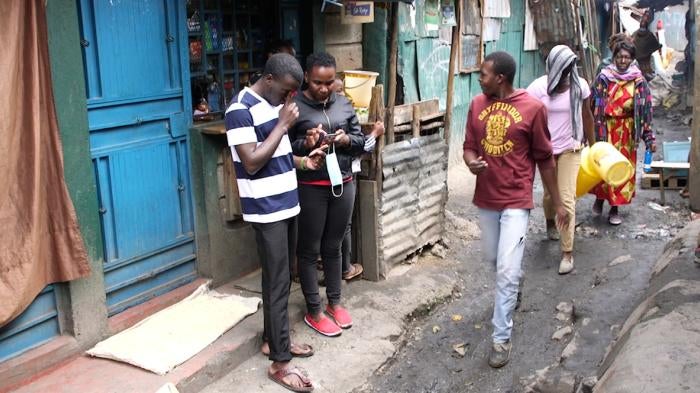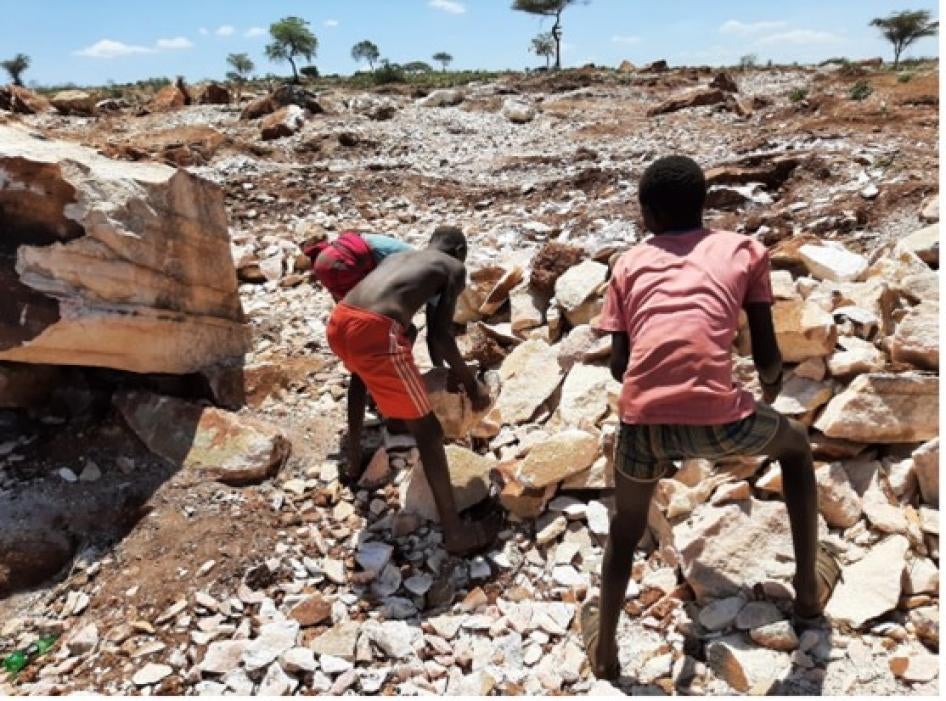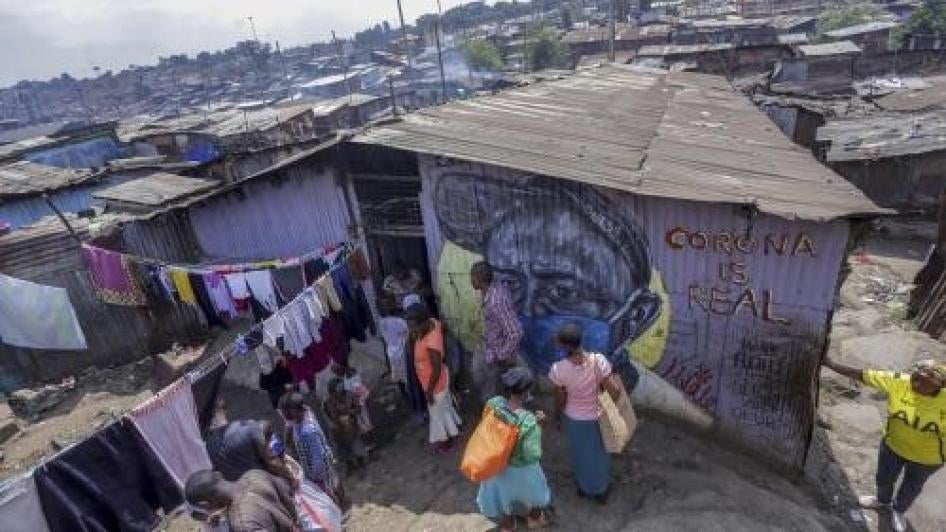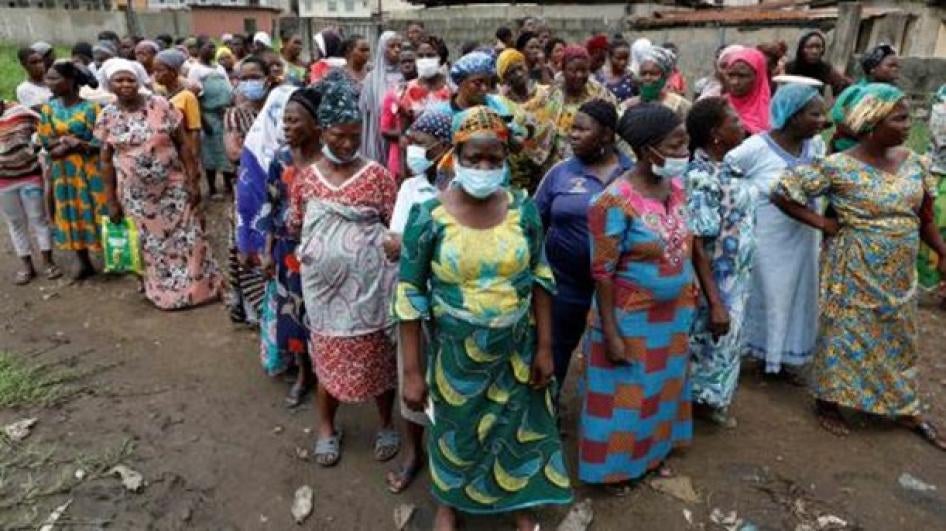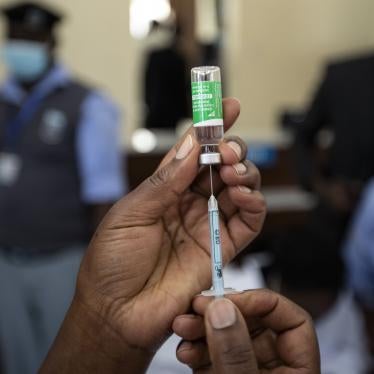(Nairobi) – The Covid-19 pandemic has highlighted the need for African governments to strengthen social protection systems and fulfill people’s rights to social security and an adequate standard of living. Many African governments introduced measures like cash transfers and food assistance in response to the rising poverty and hunger occasioned by the pandemic, but most households received no support. The World Bank forecasts that the Covid-19 crisis will have pushed an additional 29 million Africans into extreme poverty by the end of 2021.
“The Covid-19 crisis has wreaked havoc on the livelihoods of millions of households across Africa, leaving families hungry and desperate for help,” said Mausi Segun, Africa director at Human Right Watch. “African governments should urgently invest in the social protection systems needed to ensure that Africans can endure the pandemic’s devastating economic impact with dignity.”
Between March 2020 and August 2021, Human Rights Watch interviewed more than 270 people in Cameroon, Ghana, Kenya, Nigeria, and Uganda about the impact of the pandemic on access to food and livelihoods, and government efforts to respond. Researchers spoke to affected individuals and families, health workers, government officials, and representatives of nongovernmental organizations, international financial institutions, and bilateral donors, among others.
In Kenya and Nigeria, Human Rights Watch documented job losses, falling income, and widespread hunger among people living in poverty in Nairobi and Lagos. In Kenya, the research also highlighted an increase in violence against women and girls during Covid-19-related lockdowns and curfews. In Ghana and Uganda, researchers examined an increase in child labor due to the pandemic. In Cameroon, the research highlighted corruption and a lack of transparency in the government’s use of funds intended to address the health and economic impacts of Covid-19.
Interviews in Nigeria, Ghana, and Uganda were conducted by or in conjunction with partner organizations, including Justice & Empowerment Initiatives (Nigeria), Friends of the Nation (Ghana), and the Initiative for Social and Economic Rights (Uganda).
People interviewed in all five countries said that lockdowns, travel restrictions, and other measures imposed to control the spread of the virus, coupled with a pandemic-linked economic downturn, decreased their access to food and other essentials. In Ghana, a 14-year-old girl said that, after losing access to free school meals because of school closures, she worked nine hours a day gutting and scaling fish. “If I don’t do it, life will be tough for all of us,” she said.
Most people interviewed reported that they had not received any government support. “The state hasn’t helped us,” said a hotel secretary from Douala, Cameroon, who struggled to pay for her children’s food and schooling after her salary was cut by two-thirds.
The lack of unemployment support, child benefits, and other forms of financial or in-kind assistance for people who lost jobs or income reflects the weaknesses of African social protection systems. Data from the International Labour Organization (ILO) reveals that fewer than 20 percent of Africans had access to any social protection whatsoever in 2020, or when data for their country was last available.
Many African governments sought to close gaps in social protection coverage during the pandemic by introducing measures like cash transfers and food assistance. But Human Rights Watch found in Ghana, Kenya, Nigeria, and Uganda that the programs introduced or expanded reached only a fraction of households needing support.
“We keep hearing rumors about the government sharing money and food, but I haven’t seen any in my area,” said a mother of seven from Lagos State, Nigeria, who lost her job as a cleaner in March 2020 due to Covid-19-related closures.
Research in Kenya and Nigeria also revealed that corruption has at times prevented the limited available social assistance from reaching those who need it most. In Kenya, Human Rights Watch found evidence that local officials and politicians in charge of enrolling people in a Covid-19 cash transfer program ignored eligibility criteria and directed benefits to their relatives or friends instead. Other deserving households received no assistance. “We demonstrated at the chief’s office because other people were getting support while we didn’t,” said a schoolteacher from Nairobi, who lost her job during the lockdown and struggled to feed her four school-age children.
The risk of corruption has been increased by inadequate oversight over funds lent for Covid-19 response by international financial institutions, such as the International Monetary Fund (IMF). Human Rights Watch research into anticorruption requirements in emergency loans provided to Cameroon and Nigeria, as well as Ecuador and Egypt, found that the information governments disclosed about how they had spent IMF funds varied widely and was inadequate for meaningful oversight.
Under international human rights law, governments have an obligation to fulfill the right to an adequate standard of living, including the rights to food, water, and adequate housing, and the right to social security, which are also recognized as entitlements under African human rights law. The right to social security requires countries to provide people with healthcare, old-age, child, unemployment, and other benefits needed to obtain an adequate standard of living, including in times of economic crisis.
“For many African governments, the Covid-19 pandemic was a wake-up call that investing in social protection systems is vital not only to ensure that people have access to food and other basic goods but also to their country’s economic resilience,” Segun said. “Now the challenge is to improve and expand the temporary measures introduced to build robust and transparent programs that will permanently protect people's right to an adequate standard of living.”
For more details from Human Rights Watch’s research, please see below.
Rising Poverty, Hunger due to Covid-19
By September 2021, African nations had recorded 7.95 million confirmed cases of Covid-19 and 200,762 deaths, although both figures may be significantly higher because of the lack of testing capacity.
The Covid-19 crisis has also devastated the economies of many African countries, causing poverty levels to surge across the continent. World Bank economists forecast that nearly half a billion people in Africa will live in extreme poverty by the end of 2021, or about two-thirds of the world’s extreme poor, defined as people living on less than $1.90 per day.
While other regions have begun to return to pre-pandemic growth levels, the behavior of wealthy governments and corporations has created a lack of access to affordable Covid-19 vaccines in Africa. Lack of vaccines, combined with the shortage of government funds for fiscal stimulus, has slowed recovery in African nations. The World Bank projects that poverty in Africa will increase in 2021 at more than double the rate predicted before the pandemic.
Rising poverty has reduced the access of many Africans to food, water, and other elements of the right to an adequate standard of living. In Nigeria, according to National Bureau of Statistics (NBS) surveys analyzed by Human Rights Watch, levels of hunger more than doubled during the pandemic. “People have been surviving by showing love to each other,” said a member of the Nigerian Slum/Informal Settlements Federation, a network of urban poor communities. “You can’t watch your neighbor starve, but you can only give food if you have it yourself.”
In Kenya, more than 90 residents of informal settlements in the capital, Nairobi, told Human Rights Watch that Covid-related lockdowns led to extreme hunger and job losses. A 75-year-old grandmother from Nairobi, who cares for grandchildren with mental health conditions, recounted the difficulties she faced finding medication and food. “When the lockdown came, my small-scale detergents sales business became difficult,” she said. “I was not able to continue buying medication. I was borrowing food, begging, and buying food items on credit.”
Globally and in Africa specifically, the economic impacts of the Covid-19 crisis have disproportionately affected women and girls and intensified incidences of gender-based violence. Human Rights Watch found that hardship brought about by the pandemic in Kenya, as well as the government’s failure to ensure access to health, economic, and social support services amid restrictions on movement, contributed to an increase in sexual and other forms of violence against women and girls. Poverty and lack of access to alternative housing present significant barriers for people to leave abusive situations and seek help. “I was forced to stay in my home when I was facing violence because I had nowhere to go,” said a domestic violence survivor in Kisumu county.
With their household income disrupted, children in many African nations have increasingly gone hungry. The United Nations Children's Fund (UNICEF) estimated that acute food insecurity rose in Africa by almost 15 percent in the first six months of 2020. By April 2020, more than 50 million African schoolchildren had lost access to free school meals, 40 million of whom were affected for at least six months. “There were days when we slept on an empty stomach because we could not find anything to eat,” said a 14-year old laborer from Uganda, whose employer at a limestone quarry began paying him and his mother with alcohol after his business faltered during the pandemic.
Stark Inequalities in Global Access to Social Protection
According to the ILO, only 17 percent of Africans had access to at least one social protection benefit in 2020 or when data was last available, including 5 percent of unemployed workers and 13 percent of children.
There were also wide discrepancies across countries: almost half of South Africans could get at least one social protection benefit compared to just 11 percent of Nigerians and 3 percent of Ugandans. The lack of access reflects the long-term underinvestment in social protection in Africa, where governments spend less than 4 percent of their gross domestic product (GDP) on social protection programs, excluding healthcare, compared to the global average of 13 percent.
The lack of access to social protection in Africa also reflects global inequalities in social protection spending, which have widened during the Covid-19 crisis. In May 2021 World Bank data showed that residents of high-income countries had benefitted from pandemic-era social protection measures averaging $847 per person, while residents of African countries had received an average of just $28 per person.
This growing disparity has led to calls by a global coalition of nongovernmental organizations, and Olivier De Schutter, the UN Special Rapporteur on Extreme Poverty and Human Rights, for governments worldwide to establish a Global Fund for Social Protection to address the need for increased funding for social protection in lower-income countries.
Efforts to Expand Social Protection during the Covid-19 Crisis
To address the gaps in social protection coverage at the onset of the Covid-19 pandemic, 51 out of 55 African Union member states had, as of May, announced a total of 238 new or expanded social protection measures. The ILO noted that 86 percent of these measures were social assistance or “non-contributory” measures, which are funded by a government’s tax revenues and not by beneficiaries. Twenty-one percent were cash transfers or other forms of grants and 16 percent food and nutrition assistance.
In Nigeria, where more than 40 percent of its 211 million people live in extreme poverty, the federal government scaled up an existing cash transfer program that paid eligible households 5,000 naira (US$12) per month. The program made payments to almost one million households in June 2020, although that number fell to 400,000 in December 2020. The federal government also created a new rapid response cash transfer project in January 2021 for another one million households. According to federal government figures, both federal and state governments also provided 8.8 million households with short-term food assistance.
In Kenya, the government in 2020 made payments of 4,000 Kenyan shillings (US$37) every two months to more than 1.1 million people through an existing cash transfer program. In addition, it initiated a new, pandemic-specific cash transfer program that paid beneficiaries 1,000 Kenyan shillings ($9) per week and reached 332,563 beneficiaries from April to November 2020, according to government figures.
Cash Transfers, Social Assistance Still Left Many Without Support
Despite increases in social assistance, African governments have still left many people without financial or in-kind support during the Covid-19 crisis. UNICEF estimated that cash transfer programs expanded or introduced between April and September 2020 improved existing coverage by an average of just 8 percent across 27 African countries, leaving “major gaps” between poverty rates and coverage.
In Nigeria, Human Rights Watch analysis of NBS surveys revealed that in May, August, and November 2020 no more than 15 percent of households nationwide received cash transfers or food assistance. Approximately half of all households surveyed at the same intervals had run out of food in the previous 30 days. “They announced on social media that people would get 5,000 naira [$12] cash transfers,” said a water taxi driver in Lagos. “But it was just a fake promise. So many people don’t have the means to survive, and the government only looked after themselves.”
The limited support people received during the pandemic led to questions about how Nigeria’s federal and state governments used the funds allocated for its Covid-19 response. “We heard about all the money the government was supposed to be getting for Covid-19 – billions of naira – and the government talked about the food they were distributing, but most of the communities never got any,” said a community health educator in Lagos. A joint report by three Nigerian nongovernmental groups on the distribution of food assistance in Lagos during the pandemic found that “politicians hijacked the packages at the local level” and there were “no objective criteria for identifying vulnerable persons.”
In Kenya, Human Rights Watch determined that fewer than 5 percent of the 600,000 households in Nairobi’s informal settlements benefited from Covid-19-related cash transfers from April to November 2020. Many of the Nairobi residents who did get payments told Human Rights Watch that the amount they received was too little and the payments were irregular. “I started receiving 1,000 Kenyan shillings [$10] every week in April [2020], but the money was not enough,” said a mother of three. “I usually used it up on the same day I received it for our domestic needs.”
Conditions were even worse for those who did not get cash transfers at all. “I had no food for my children, and they would cry for days,” said a single mother of two who breached Covid-related restrictions on movement to wash clothes for a small fee.
In Uganda, the Initiative for Social and Economic Rights, an NGO, estimated in December 2020 that social protection covered only 3 percent of the country’s 9.5 million people “in dire need of safety nets.” Many of the 32 Ugandan children interviewed about the impact of the pandemic had taken on work because their families could not meet their basic needs. A 13-year-old girl said that, before she started working by selling brooms on the street, her family survived on tea and porridge. “I started working because we were so badly off,” she said. “The hunger at home was too much for us to sit and wait.”
In Ghana, 21 of 24 children interviewed said their families had received no government assistance. Most of the children had started to work or increased their hours during the pandemic to support themselves or their families. “I went to work to at least care for myself,” said a 15-year-old boy, who said his friends told him about the money they earned carrying goods.
Countries with more developed social protection systems prior to the Covid-19 crisis have had more success in expanding coverage. South Africa, whose long-running social protection system was already providing child and social grants to 18 million people prior to Covid-19, sent out “top-up” benefits payments to eligible beneficiaries between May and October 2020.
South Africa also introduced a special monthly 350 Rand ($24) Covid-19 grant from May 2020 onwards that expanded social protection to six million unemployed adults not receiving other benefits. South Africa still saw a dramatic rise in hunger early in the Covid-19 crisis, but the top-up payments and grants have offered households some protection from the worst economic effects of the pandemic, contributing to a national debate about introducing a universal basic income grant.
The Need for Permanent, Comprehensive Social Protection Systems
As Covid-19 continues to spread in Africa, its governments should build on the expanded social protection measures created during the pandemic and work towards universal social protection benefits to ensure that families who have lost jobs or income can maintain an adequate standard of living.
African governments should incorporate the right to social security into domestic law and enact, fund, and provide permanent entitlements to social protection benefits, such as universal child allowances and financial support for unemployed workers, including in the informal sector. Governments should ring-fence the funding devoted to social protection during the pandemic to protect it from cuts in future budget cycles and should also develop proposals for mobilizing more revenue through progressive tax measures.
International financial institutions and bilateral donors should also significantly increase the financial support and technical assistance available for expanding social protection in Africa. They should also refrain from imposing conditions that indirectly or directly force governments to withdraw the increases in support for social protection undertaken during the Covid-19 crisis. Any international spending on social protection should be combined with measures to tackle corruption and hold recipient government institutions accountable for their expenditures.
